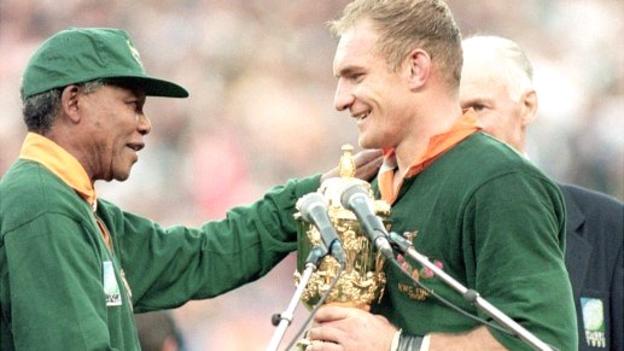World Radio Day: Interview with South African rugby legend Francois Pienaar
Fri, 9 February 2018

Interview courtesy of UNESCO for the celebration of World Radio Day 2018.
Francois Pienaar helped bring the Rainbow Nation together like never before, with his relationship with former South African President Nelson Mandela the inspiration for the 2009 film Invictus. The former South African rugby captain shares his thoughts on radio and sports.
As they say, in 1995 at Ellis Park, “When the whistle blew, South Africa changed forever”. From the flashback, what can you share with us?
It was an incredible moment. It was very emotional too. After the whistle blew, I don't think that we realised the impact that that win had on the nation under the leadership of Mr Mandela. For the first time in our country’s history, everybody in South Africa was a World Cup winner.
It is a known fact that then-President Mandela was using rugby, a sport predominantly represented by Whites to unite the nation. The slogan 'One Team, One Country' was coined to bridge the divide among the communities. Now when you look back, how successful do you think it was?
It was incredibly successful and very smart. When I walked into the meeting room and I saw "One Team, One Country", it immediately focussed the attention. We knew that it was going to be big, if we did well, for every South African, but we had no idea whatsoever, that it was going to be so big; that our nation would rally behind the team and behind a sport that was dominated by whites and hated by black people in South Africa. Over the course of 6 weeks, they became, sort of fans and came to love the game that players played for the Springboks.
How was media coverage like then for such a noble effort undertaken by you and then-President Mandela? How important was it the way the media was portraying the situation?
Without the media, people don't know what's happening. Media is crucial in terms of informing people, getting the right tone and getting the balance right. The media was central in keeping people informed on this journey. And especially radio, because in the far outlying rural areas of South Africa – the townships – people would just have radio. They would not have television and they would be glued to the radio listening to the matches and results.
On World Radio Day, we are advocating for coverage of such stories. When you look back and when you think about media narrative, do you think that this special moment, which was also translated into a movie, could have happened without the support from radio, from TV and from media?
Again, I come back to how do you share emotions, how do you share change, how do you share views and narratives with people without media. Radio is one of those strong media that I personally love, and you are captured by radio when you are driving to work in morning and driving home. Given the traffic jams globally, that's where you are far more intent in listening what is being shared and debates being held.
I will also like to talk about you’re your relationship with Mr Mandela, a lot has been written about it, is there still something that people don’t know and you would want to share?
I was so lucky that my relationship with Mr Mandela actually grew after the 1995 World Cup. He was the godfather to both our children and he invited himself to our wedding. We had an incredible relationship with him and also later on with Ms Graca Machel at his side. I was so lucky to have such a great experience with one of world’s greatest leaders.
For World Radio Day, we are celebrating the uniting power of sports and radio – how do you think the medium of radio, which is quite powerful in your country, can contribute more effectively to raising awareness of the kind of examples like the Springboks in 1995?
One of the attributes that you should develop is storytelling, because storytelling is so powerful, and that's what radio does better than any other medium. Listening to the voice of a person speaking, telling a story, is far more captivating than seeing something onscreen, for me personally. So when you drive to work and you drive home and you’ve got your radio on, the debates that are taking place, especially in South Africa, it is amazing to hear people express themselves.
What is your message for World Radio Day?
Keep sharing the stories, keep telling great stories and inspiring people.